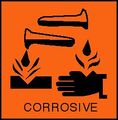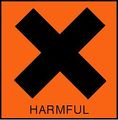Sodium Hydroxide material data safety sheet. Reproduced with kind permission of the Department of Chemistry, Oxford University.
Last updated September 17, 2010
| Common synonyms |
|
| Formula |
NaOH
|
| Properties |
- Form: White semi-transparent solid, often supplied as pellets weighing about 0.1g
- Stability: Stable, but hygroscopic.
- Absorbs carbon dioxide from the air.
- Melting point: 318°C
- Water solubility: high (dissolution is very exothermic).
- Specific gravity: 2.12
|
| Principal hazards |
- Contact with the eyes can cause serious long-term damage.
- The solid and its solutions are corrosive.
- Significant heat is released when sodium hydroxide dissolves in water.
|
| Safe handling |
- Always wear safety glasses.
- Do not allow solid or solution to come into contact with your skin.
- When preparing solutions swirl the liquid constantly to prevent "hot spots" developing.
|
| Emergency |
- Eye contact: Immediately flush the eye with plenty of water. Continue for at least ten minutes and call for immediate medical help.
- Skin contact: Wash off with plenty of water. Remove any contaminated clothing. If the skin reddens or appears damaged, call for medical aid.
- If swallowed: If the patient is conscious, wash out the mouth well with water. Do not try to induce vomitting. Call for immediate medical help.
|
| Disposal |
- Small amounts of dilute sodium hydroxide can be flushed down a sink with a large quantity of water, unless local rules prohibit this.
- Larger amounts should be neutralised before disposal.
|
| Protective equipment |
- ALWAYS wear safety glasses when handling sodium hydroxide or its solutions.
- If you need gloves, neoprene, nitrile or natural rubber are suitable for handling solutions at concentrations of up to 70%.
|
| Further information |
More extensive safety data |
Bio-rich-time-poor 21:28, 25 June 2011 (BST)

